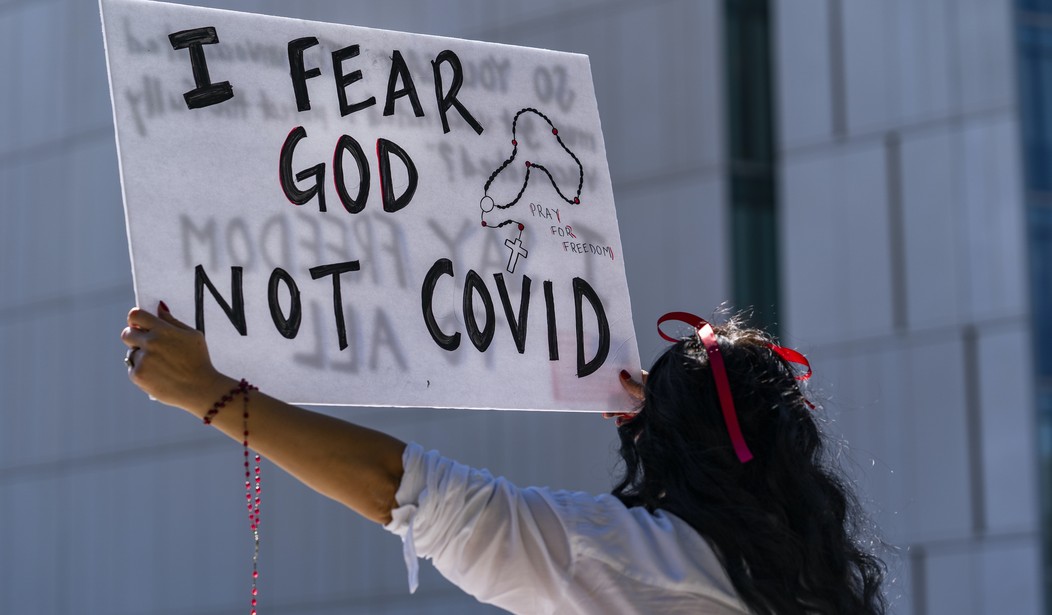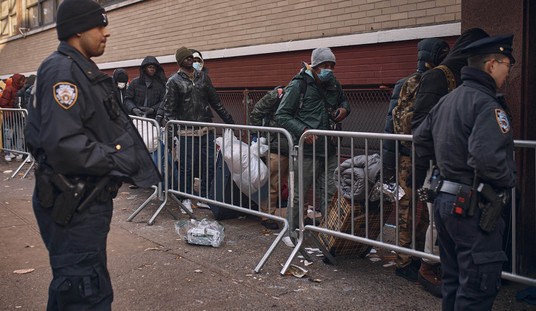I could have written the headline the other way around, as Forbes did. “UK study: Natural immunity provides as much from protection from COVID as the Pfizer vaccine does.”
That’s the more salient point for public policy, right? If recovering from infection renders you roughly as immune as the vaccine does, then vaccine mandates and vaccine passports should include an exception for people who can prove they have natural immunity via an antibody test.
The reason I’m stressing that the vaccine does as well as natural immunity is because a study from Israel published in late August came to the opposite conclusion. Natural immunity is vastly better than vaccination, Israeli researchers found, announcing that the risk of a breakthrough infection if you’ve had your shots is 27 times greater than the risk of reinfection if you’ve already recovered from COVID.
How do we square that result with this UK result? I think maybe we shrug and say, “Science, man.”
Figure 5 shows the risk ratios for testing positive by vaccine exposure group during the Delta-dominant period, irrespective of vaccine type:
two vaccine doses (14 days or more previously) reduced the risk of testing positive by 67% (95% confidence interval: 64% to 70%) during the Delta period. During the Alpha period this figure was 79% (95% confidence interval: 73% to 84%)
there was no evidence that the reduction in risk of infection from two vaccine doses (14 days or more previously) differed from that of previous natural infection (71% risk reduction, 95% confidence interval: 65% to 77%)
The same was true for symptomatic infection. People who’d recovered from COVID previously faced about the same risk of getting sick again from COVID as people who’d had their shots. Does that mean vaccination is just as good as infection — and vice versa?
The reason scientists are having trouble giving a definitive answer is that immunity varies from person to person, particularly among those who’ve already had COVID. Healthy people see a huge surge of antibodies after they get their shots but not every healthy person who tests positive for the virus gets the same flood of protection. From the Times:
“That’s the thing with natural infection — you can be on the very low end of that or very high end, depending on what kind of disease you developed,” said Akiko Iwasaki, an immunologist at Yale University…
Research published by Dr. Iwasaki’s team in May showed a stepwise increase in the level of antibodies with rising severity of infection. About 43 percent of recovered people had no detectable neutralizing antibodies — the kind needed to prevent reinfection — according to one study. The antibodies drop to undetectable levels after about two months in about 30 percent of people who recover.
Vaccine immunity fades over time, as countries like ours and Israel have discovered to their chagrin, but natural immunity can fade too. Even the Israeli study that alleged the superiority of natural infection found that the gap in protection between natural immunity and vaccine immunity shrank over time. It may be that whether you have durable protection against COVID following an infection depends in part on how severe your illness was. A mild case that you suffered last year might not leave you as immune in 2021 as someone who was vaccinated three months ago, say. And age seems to matter. Per the Times, “while the immunity gained from vaccines and infection is comparable among younger people, two doses of the mRNA vaccines protected adults older than 65 better than a prior infection did.”
Infection does have its immunity advantages, though. It gives your immune system a look at the entire virus, not just the spike protein, and for a longer duration. Parts of the virus can linger in the blood and organs whereas the spike protein created by the vaccine is cleared quickly. All of that means natural immunity can lead the body to produce more sophisticated and adaptive antibodies than vaccine immunity might. And those antibodies operate on a larger battlefield: “The virus would stimulate defenses in the nose and throat — exactly where they are needed to prevent a second infection — while the vaccines produce antibodies mainly in the blood,” the NYT adds.
Does that mean the Israeli study is right and the UK study wrong? Maybe not. One expert told the paper that the Israeli data is complicated by the fact that the pool of vaccinated subjects was more likely to include older and immunocompromised people than the pool of subjects who caught and recovered from COVID. That might explain why there was such a huge gap in protection between the two groups — not because natural immunity is so much better but because the cohort of vaccine recipients was so much weaker on average.
The only thing that’s clear in the great “vaccine vs. infection” immunity debate is that if you’ve had COVID and then get vaccinated, you gain gangbusters immunity that can defeat variants that haven’t even emerged yet. A CDC study in August compared one group of Kentuckians who’d had the virus and later got their shots to a group that had had it and then remained unvaccinated. The second group was more than twice as likely to get reinfected as the first. Essentially, it appears that if you have “hybrid immunity” in the form of infection plus later vaccination, you’re done with the pandemic.
I’ll leave you with this tweet, which implicitly poses a question. Whose immunity will wane faster, someone who was vaccinated or someone who’s had COVID? (Assuming they each began with the same number of antibodies, I mean.) Is Bob Wachter right that a community in which everyone’s had three doses will have lower infection rates after a year, say, than a community in which everyone’s had COVID but remained unvaccinated? How many boosters will the vaccinated need for their immunity to outlast immunity from natural infection?
All US regions–hi & lo vax–now have similar case rates. Delta's hi Ro is likely creating relatively = population immunity (⬆vax/⬇cases≊⬇vax/⬆cases). If so, problem is ⬆vax regions will get boosters, while places w/ hi case-derived immunity will get progressively vulnerable. pic.twitter.com/oZXUlWJ72J
— Bob Wachter (@Bob_Wachter) October 19, 2021







